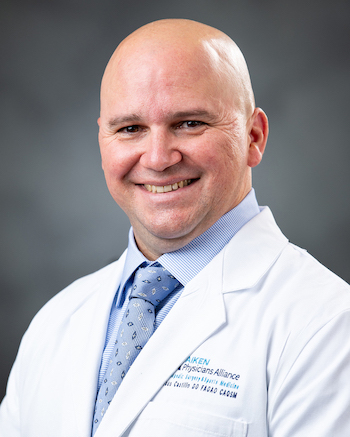Personalized sports medicine and orthopedic care for a life in action
September 13, 2022
Fall Sports and the Young Athlete
 Participation in competitive and noncompetitive sports offers many advantages to young people, including the development of a fitness regimen, better weight control, improved cardiorespiratory fitness and the strengthening of bones and muscles. Sports participation also develops teamwork and problem-solving skills and helps young people learn how to deal with both success and failure, promotes leadership skills and boosts self-esteem.*
Participation in competitive and noncompetitive sports offers many advantages to young people, including the development of a fitness regimen, better weight control, improved cardiorespiratory fitness and the strengthening of bones and muscles. Sports participation also develops teamwork and problem-solving skills and helps young people learn how to deal with both success and failure, promotes leadership skills and boosts self-esteem.*
“It's important for kids to stay active, even during breaks,” says Jesus Castillo, DO, FAOAO, CAQSM, an orthopedic surgeon and sports medicine specialist with Aiken Regional Medical Centers and Aiken Physicians Alliance Orthopedics. “An offseason workout regimen is often recommended to help avoid issues once fall sports start.”
Avoiding Overuse Injuries
According to Dr. Castillo, conditioning programs can be created for a particular sport and in partnership with an athlete’s coach. However, playing varied sports can help to avoid overuse injuries. Overuse injuries can occur gradually over time as a result of repetitive actions involved in a specific sport and insufficient time for the body to heal between playing. Examples include elbow injuries in a young pitcher or shoulder injuries for a swimmer. Because the bones, muscles, tendons and ligaments are still growing, young athletes are at greater risk for injury than adults. The result of overdoing a sport can cause injuries that may affect a young athlete long term.
“To help avoid overuse injuries, young athletes can benefit from playing multiple sports throughout the year,” says Dr. Castillo.
The most common sports injuries seen by Dr. Castillo include ankle sprains, knee or shoulder injuries and fractures. Taking a break to recover and allow the body to heal, followed by an individualized course of physical therapy, is typically the preferred treatment for overuse injuries, says Dr. Castillo. For an acute sports injury, prompt first aid treatment and the RICE method (rest, ice, compression, elevation) is often recommended.
Staying in the Game
After a break in sports play or before beginning a new sport, schedule a pre-participation exam with a primary care provider. The exam screens for potential problems and helps to ensure a young athlete is physically and mentally ready for sports.
Dr. Castillo suggests practicing the following prevention measures to help keep an athlete in the game:
- Hydration replaces water loss from sweating, helps to maintain the body’s temperature and helps prevent cramps, heat exhaustion and heat stroke.
- Warm up with dynamic stretching, which includes exercise that mimics the movements of a sport, such as making a series of circles with the arms before swimming. Other helpful exercises include trunk twists, walking lunges or leg swings.
- Cool down the body to provide it a chance to return to its baseline. This can include gentle stretching and breathing.
Maintaining a healthy diet is also essential. “It’s okay to eat some sweets or fried foods,” says Dr. Castillo. “But only in moderation. Eating fruits, vegetables and healthy proteins – such as grilled chicken, turkey and lean meats – is essential to a well-balanced diet. Hydration with water, not soda, is also vital.”
Comprehensive Orthopedic and Sports Medicine Services for all Ability Levels
As a board-certified orthopedic surgeon with a sports medicine subspecialty, Dr. Castillo has specialized training in care for both the athlete as well as the non-athlete and for those who simply wish to maintain an active lifestyle.
Dr. Castillo treats all ages, from young children who come to the emergency room with a fracture, high school and college athletes, and middle-aged and older adults who want to keep up with recreational fitness, despite shoulder problems, arthritis or other conditions.
Non-surgical treatment may include therapeutic injections to help relieve pain and inflammation. Dr. Castillo also works closely with physical therapists on rehabilitation recommendations to help patients with range of motion or imbalance issues.
Surgical Procedures
When surgery is necessary, Dr. Castillo specializes in minimally invasive procedures to treat conditions of the shoulders, hips and knees, including:
- ACL (Anterior Cruciate Ligament) issues
- Arthroscopic shoulder and knee surgery
- Bicep tendonitis
- Cartilage restoration
- Hip arthroscopy, typically recommended for active patients under 50 to help prevent the onset of arthritis later in life
- Meniscus problems
- Rotator cuff repairs
Other surgical procedures include total shoulder, knee and hip replacements.
Individualized Care
“My philosophy is the same now as when I served in the military,” says Dr. Castillo. “I make sure I stay ahead of the latest techniques and technologies to help provide the best possible care for my patients. Whether this is care for an athlete or Marine, who needs to get back to high-intensity exertion, or simply helping an older person maintain an active lifestyle, my care is always personalized to the patient’s goals and activity level.”
About Jesus A. Castillo, DO, FAOAO, CAQSM
 Dr. Castillo earned his medical degree with honors at Nova Southeastern College of Osteopathic Medicine in Fort Lauderdale, Florida. He completed his residency training in orthopedic surgery and served as chief orthopedic surgery resident at the University of Medicine and Dentistry School of Osteopathic Medicine in Stratford, New Jersey. He also served as an officer, orthopedic surgeon and Head of the Department of Orthopedics in the Medical Corps of the United States Navy at the Naval Medical Center Camp Lejeune in Jacksonville, North Carolina.
Dr. Castillo earned his medical degree with honors at Nova Southeastern College of Osteopathic Medicine in Fort Lauderdale, Florida. He completed his residency training in orthopedic surgery and served as chief orthopedic surgery resident at the University of Medicine and Dentistry School of Osteopathic Medicine in Stratford, New Jersey. He also served as an officer, orthopedic surgeon and Head of the Department of Orthopedics in the Medical Corps of the United States Navy at the Naval Medical Center Camp Lejeune in Jacksonville, North Carolina.
Dr. Castillo is board certified by the American Osteopathic Board of Orthopedic Surgeons and holds a subspecialty certification in Orthopedic Sports Medicine. He is a fellow of the American Osteopathic Academy of Orthopedics and the American Academy of Orthopedic Surgeons.
Dr. Castillo is fluent in Spanish.
Source: *https://health.gov/sites/default/files/2020-09/YSS_Report_OnePager_2020-...
